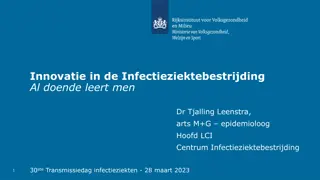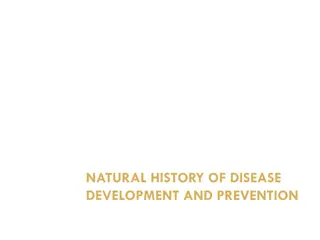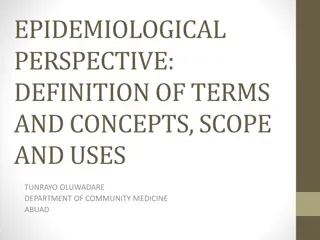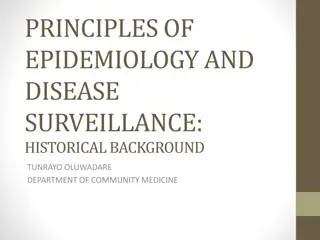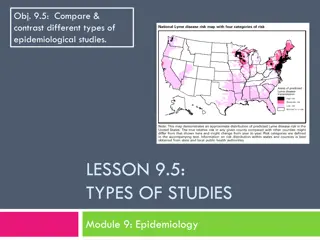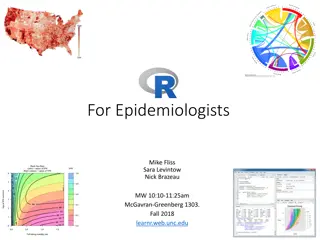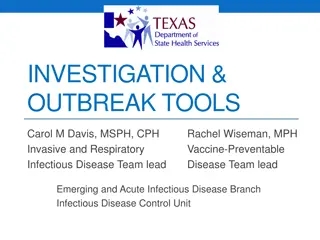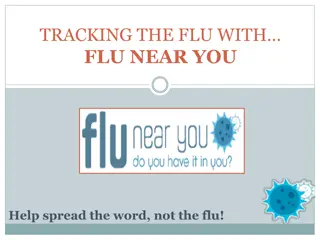Innovations in Infectious Disease Control: Insights from Experts
Explore the latest advancements in infectious disease control through the lens of renowned epidemiologists and researchers. Delve into the impact of the COVID-19 pandemic, the historical prevalence of infectious diseases, and early infection prevention practices. Uncover the evolution of infectious
0 views • 22 slides
Understanding the Natural History of Disease Development and Prevention
The natural history of disease development outlines the progression of a disease in an individual without intervention, from exposure to outcome. Learning objectives include defining prevention terms, understanding disease severity, prevention levels, and intervention measures. Studying disease prog
4 views • 16 slides
Understanding Epidemiological Perspective: Definition, Scope, and Uses
Epidemiology is the scientific study of health-related states and events in populations, focusing on their distribution and determinants. This field helps in analyzing disease frequency, incidence, prevalence, mortality, and morbidity rates. Epidemiologists also examine disease distribution over tim
0 views • 29 slides
Evolution of Epidemiology: Historical Perspectives and Contributions
The evolution of epidemiology spans centuries, beginning with Hippocrates in 400 BC and progressing through key figures like John Graunt, James Lind, Edward Jenner, John Snow, and others. From the observation-based practices of ancient times to the groundbreaking experiments and analyses of the 17th
3 views • 20 slides
Understanding Descriptive Epidemiology in Public Health
Descriptive epidemiology involves the study of disease occurrence and distribution in populations. It focuses on describing patterns of disease occurrence based on who gets sick, where rates are highest and lowest, and temporal patterns of disease. Descriptive studies are essential for public health
0 views • 18 slides
Understanding Epidemiological Studies and Their Importance in Public Health
Epidemiological studies are crucial in understanding the distribution and determinants of health events in populations. They encompass various types, such as descriptive and analytical epidemiology, focusing on factors contributing to diseases. Epidemiologists use statistical methods to study health
0 views • 14 slides
Epidemiologists Course Overview and Logistics for Fall 2018
Explore the detailed course overview and logistics for epidemiologists in the fall 2018 semester. From introductions to course progression and practical assignments, this document provides essential information for those familiar with programming languages like SAS. Discover the approach, format, an
0 views • 28 slides
Investigation & Outbreak Tools in Infectious Disease Control
Explore a comprehensive guide to investigation and outbreak tools in infectious disease control, including types of tools, recommended books, useful websites, subject matter experts, and resources from the Texas Department of State Health Services. Discover essential resources for field epidemiologi
0 views • 18 slides
Monitoring Flu Activity with Flu Near You
Flu Near You (FNY) is a participatory disease surveillance system for influenza-like illness (ILI) that allows the public to report their health status weekly. Users can contribute data, view local/national ILI reports, access a Vaccine Finder tool, and connect with public health resources. Created
0 views • 7 slides
